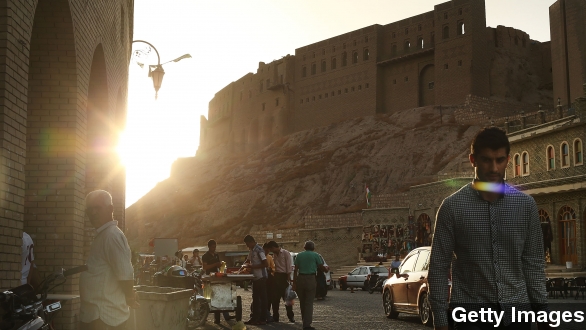"When we have a mandate to help ... and when we have the unique capabilities to avert a massacre, then I believe the United States of America cannot turn a blind eye." (Via The White House)
It didn't take long. The U.S. began airstrikes in Iraq hours after President Obama authorized them.
Pentagon Press Secretary Rear Adm. John Kirby confirmed the strike against ISIS artillery in a tweet Friday.
Citing the Pentagon, The Guardian reports the airstrikes that have taken place so far came in the form of two 500-pound laser-guided bombs, which were dropped on ISIS fighters near Irbil.
Irbil is the capital of Iraqi Kurdistan, the semi-autonomous region that's often been characterized as a safe-ish place for foreign visitors.
It's important because — as the BBC points out — the city served as something of a base for the U.S. military in 2003.
The airstrikes are intended to stop ISIS' advance toward the city. The militant group now calls itself the Islamic State. (Video via Journeyman Pictures)
Al Jazeera reports it's not clear how many people might have died or been injured in U.S. airstrikes so far.
But before the strikes were even authorized, RT characterized the idea like this:
"But for many Iraqis, the prospect of being bombed by the U.S. again is no less daunting."
And in truth — the call to authorize the airstrikes has faced some criticism in the U.S., too.
PHYLLIS BENNIS, DEMOCRACY NOW!: "There is no American military solution, and yet he’s authorizing American military actions."
BRIAN WILLIAMS, NBC: "It was the single foreign policy promise of Barack Obama to get American involvement out of Iraq, and now circumstances in Iraq draw America ... back in."
Then again, House Speaker John Boehner called the use of airstrikes "appropriate." Boehner still argued, "The president needs a long-term strategy." He didn't, however, specify what that should look like.
In addition to the airstrikes, the U.S. is doing airdrops of resources like food and water to the minority groups threatened by ISIS militants and trapped in nearby mountains. As for further action — like ground troops — aside from the hundreds of military advisers already in Iraq, President Obama emphasized a ground operation isn't planned.


